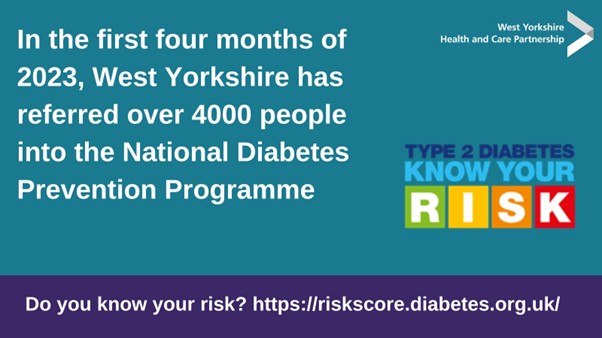Hello, my name is Jan.
I’m pleased to be able to share my experience of joining the NHS Diabetes Prevention Programme (NDPP).
In September 2022 I was shocked to be told that my blood sugars were in the pre-diabetic range. I didn't see myself as someone who would be at risk of diabetes. My body mass index (BMI) has always been within the normal range, and I am physically active. I love going for long walks and I do lots of gym classes and dancing. I have a reasonably healthy diet and do most of my cooking from scratch.
I don’t have any family history of diabetes. But, due to postpartum psychosis in 1999 and a subsequent lengthy psychotic depression in 2018, I have spent several years on various antipsychotic and antidepressant medications.
In September 2022 I received a text from my GP practice inviting me to an annual health check. There was no information about why I had been invited, what it related to, or why it was important. However, through my work in primary care, I knew about serious mental illness (SMI) health checks so I thought this might be the reason for my invite.
Many people being invited for these annual health checks, without an explanation as to how they might benefit from them, may have no idea what they were being invited to or why it mattered. Even though I consider myself to be generally pretty good at looking out for information, nobody had ever explained to me the risk of long-term side-effects of the medications I took. You are often only told about short-term side-effects, such as possible weight gain, dry mouth, blurred vision. What I wasn’t informed about was the potential long-term effects of my antipsychotic medications. I now know these are understood to cause changes to blood sugar levels, blood lipid levels, cardiac arrhythmias. I’m not saying that everybody would get these symptoms, but for people who are on antipsychotic and antidepressant medications the risk of these side effects is significant.
And then there’s the risk of dying prematurely. We know adults living with SMI are (statistically) more likely to die prematurely than other adults. It is estimated that for people living with SMI, two out of three deaths are linked to physical conditions which are preventable and/or treatable, for example, high blood pressure. I do not feel those inviting people to attend an annual health check are telling people enough about why these are so important; and why it is even more important for people living with SMI to attend their health check.
 The NDPP provides people with a structured education programme over nine months via a peer support group, led by a skilled health coach. I have been attending the NDPP at Huddersfield Leisure Centre. I believe this to be a great venue because it gets me (and others attending the programme) into the centre. When at the leisure centre we can see the types of classes on offer, the gym equipment, and the swimming pool; and also find it reassuring that there are all types of people who go there to keep fit and stay healthy.
The NDPP provides people with a structured education programme over nine months via a peer support group, led by a skilled health coach. I have been attending the NDPP at Huddersfield Leisure Centre. I believe this to be a great venue because it gets me (and others attending the programme) into the centre. When at the leisure centre we can see the types of classes on offer, the gym equipment, and the swimming pool; and also find it reassuring that there are all types of people who go there to keep fit and stay healthy.
I have completed 7 of the 13 NDPP sessions (these are held monthly) and I really enjoy being in a group with people who are there with a similar aim to reduce their blood sugar levels. For me, the most enjoyable aspects of the sessions are the informal chats and the banter with the other participants – the sharing of experiences is encouraged by the course leader, who is really excellent.
For me, sharing with peers how to overcome challenges and encouraging each other is really important. One rainy February night we were talking about the difficulty of getting exercise when it’s so cold and dark outside. One of the peer group members is really into reggae music and he said he puts his music on, has a dance in the kitchen gets some exercise in that way.
The NDPP has helped me to reflect on how I can make permanent changes to my lifestyle, and I think that's one of the benefits of a nine-month long programme. I could say I'm never going to have another glass of wine or another cake again. Well, that's not true – of course I am! But I know that I can make changes that are significant enough to make a difference to my health and wellbeing and which are also sustainable for the rest of my life. Knowing that many premature deaths from serious mental illness (SMI) are avoidable and that there is information and support available to help people make changes to live more healthily and for longer, my message is this: if you, or anyone you care about, has SMI or is worried about their own health please do take up the offer of a health check.
Thank you for reading,
Jan

